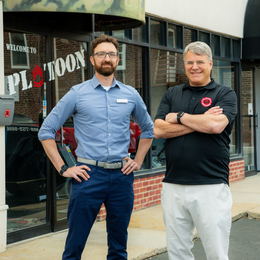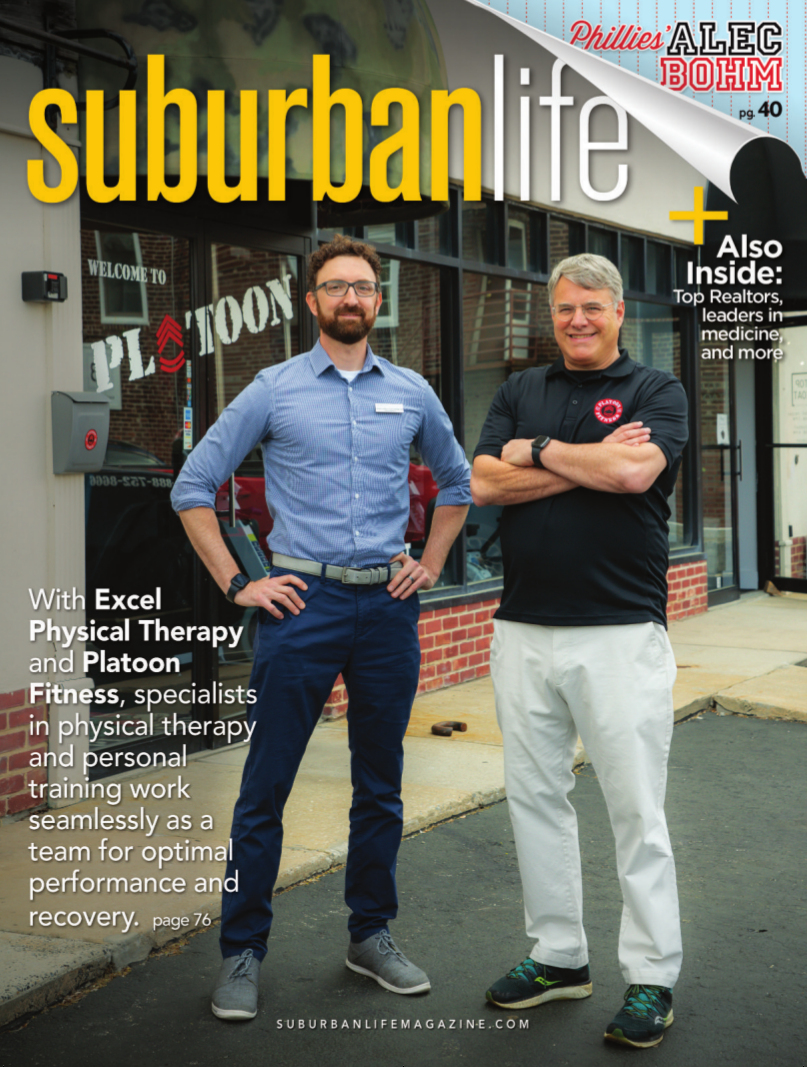
Stronger Together
With Excel Physical Therapy and Platoon Fitness, specialists in physical therapy and personal training work seamlessly as a team for optimal performance and recovery.
The human body is incredibly complex, with a delicate network of ligaments, tendons, muscles, and cartilage supporting the skeletal system. An injury to any one of these components can result in a major setback even for the fittest and strongest of athletes—to say nothing about what an injury might mean for anyone coming off the couch in the time of a pandemic.
The road to recovery can be equally complicated, which is why many people turn to a skilled physical therapist in their quest to heal. Once the therapy is complete, it’s easy to return to bad habits.
Enter Excel Physical Therapy, which has 36 locations throughout the Philadelphia area, and Platoon Fitness, which has been serving the Philadelphia area for more than 25 years with locations in Bryn Mawr and Philadelphia’s Washington Square neighborhood. (Platoon also offers training at a client’s home or place of business.) The two organizations have been mastering the art of the handoff for more than 10 years to help clients continue their forward momentum without interruption.
According to Todd Scott, founder of Platoon, and Russ Sarault, PT, DPT, Cert MDT, clinic director of Excel’s Villanova location, the partnership creates tremendous value for anyone contending with an injury or just wanting to lose weight without injury. Take, for instance, the research physician who came to Excel with work-related back pain resulting from having to remain stationary for long periods of time—a familiar experience to so many. After making significant progress, she wanted to continue to improve her fitness level, so Sarault referred her to Platoon. She connected directly with Scott, who had detailed notes in hand, for a seamless transition.
Then there was the high school rugby player who needed surgery to repair a shoulder injury. Although he had to take a hiatus from playing, he wanted to maintain his conditioning while his shoulder healed. Sarault and Scott worked closely to create an optimal plan for the young athlete.
“What makes this work so well is that our staffs know one another,” Scott explains. “People may have had the experience of being released from physical therapy and being on their own—or maybe being handed off to someone else with an almost ‘good luck’ type of attitude. But this is a seamless transition between two specialists.”
When Sarault transitions clients to Platoon, Scott connects with the individual to learn more about the individual’s specific needs and goals so he can match the individual to the appropriate personal trainer with Sarault’s help, and vice versa.
“You’re not dealing with assistants or secretaries—you’re dealing directly with owners,” Scott says. “We have really high expectations, and there’s a strong level of trust between Excel and Platoon because of the length and depth of our relationship, that doesn’t happen overnight.”
For Platoon, “the best” means instructors who are professional, seasoned, certified, and insured. They have the right attitude and a problem-solving skillset. Scott says he hires only degreed personal trainers who have a minimum of three years of professional personal training experience. Of the industry’s 2,800-plus certifications, Platoon accepts only a handful. Furthermore, every candidate undergoes an extensive criminal and child-abuse background check. Anyone who completes the Instructor Candidate System—even the most experienced instructor—shadows seasoned Platoon instructors for up to 40 hours so he or she can learn Platoon’s systems and methods, otherwise known as “the Platoon way.”
“We expect a high level of skill and dedication to the whole person that we aren’t willing to compromise on,” Scott says. “A lot of places simplify personal training, and they don’t require such a high level of service. But we take it seriously, and all our trainers are specialists at what they do. We do not want gig or side-hustle trainers. Teamwork and passion for helping others are key.”
Sarault says this commitment is what drew him to refer patients to Platoon in the first place.
“I was really impressed by their systems and model, and I liked that they were geeks about the human body and about fitness,” he recalls. “As a physical therapist, I can feel good about sending my patients to them, whether those patients are continuing with rehab or they want to work toward new goals. Our mutual respect just rolled naturally into collaborating. We refer patients back and forth because we believe it truly helps our patients.”
Even when patients have wrapped up their PT with Excel, Sarault says he tends to stay in touch with them.
“Our patients are patients for life,” he says. “When I discharge someone, I may not be seeing them regularly, but I’m still checking in.”
Back in Action
The two companies believe two separate locations with specialized teams give them each the ability to focus on what they do best. These days, with so many factors sometimes adding to a person’s challenges, Sarault says the affiliation with Platoon gives him peace of mind because he knows his patients will transition seamlessly and continue receiving optimal care.
“We can competently return our athletes to the field following an ACL tear, but we want them to excel and be better than they were prior to injury,” he says. “That is where this relationship comes in handy. A patient can smoothly transition from their rehabilitation to performance training with Platoon.”
In this case, it’s the continuum of sports medicine and human performance. However, it is not just for athletes; it is for everyone. Whether it be the weekend warrior, the mother of four, or the retiree, everyone can use some help to achieve their functional goals. Mobility and stability enable people to remain active as they grow older.
Ongoing rehabilitation plans are rooted in science and logic to help patients achieve their goals, with Platoon’s instructors picking up where Excel’s personnel left off. Excel patients work exclusively with one physical therapist for the duration of their care. That therapist works with the patient’s primary Platoon instructor.
“It’s one on one with your physical therapist and one on one with your personal trainer,” Sarault adds. “There’s no aides and no assistants, and you aren’t getting passed around. You’re getting personalized, hands-on treatment.”
Despite the one-size-fits-all, one-stop-shop mentality that too many practitioners seem to embrace, Scott and Sarault believe a person’s health is precious and deserves to be in the hands of a specialist.
“You want a person that is solely dedicated to their specialty and therefore an actual expert in the field,” Scott explains. “That’s what you get at both Excel and Platoon. We’re both incredibly passionate about our work.”
Platoon Fitness is located at 899 Penn Street in Bryn Mawr and 716 Walnut Street in Philadelphia. For more information, visit www.platoonfitness.com or call or text (215) PLATOON (752-8666). Mention this article and get a free Physical Therapy Screening and Platoon Personal Training session.
Excel Physical Therapy – Villanova is located at 734 E. Lancaster Avenue. Excel PT has 36 locations throughout southeastern Pennsylvania. To schedule an appointment, call (610) 964-1700 or visit www.excelphysicaltherapy.com for more information. Excel offers complimentary physical therapy screenings.
Photography by Jody Robinson
Published (and copyrighted) in Suburban Life magazine, April 2021.



